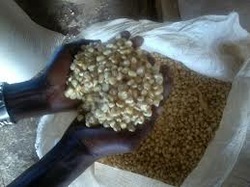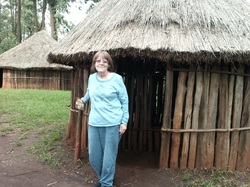
God comes to the hungry in the form of food. Mahatma Gandhi
I am in Kenya to get a sense of the culture of the Kenyan Unitarian Universalists, but that is not best done through worship attendance. To know the power of their vision, I am exploring their social justice projects. In Kitengela, one ministry is food.
The traditional staple food of many African countries is a cornmeal (posho) mush called in Swahili ugali. It is eaten combined with sukuma wiki (literally "stretch the week") which can be collards or kale but is often walking stick cabbage. You mix the two together and eat them with your fingers. I guess the closest thing we have to this back home is greens and cornbread.
Familiar with the necessity of this staple food, the Kitengela congregation is serving their community throughout the entire cycle. They have a bit of farmland in the Central Rift Valley where they hire local unemployed people to help them with planting and harvesting maize. The kernels come to the city to a small rented room where they have installed one of three posho mills which they are purchasing on credit. There a local woman who belongs to the church is given meaningful employment grinding the maize into meal and selling it inexpensively to the neighbors. The congregation provides cornmeal to its poorest members. Ruai Congregation also has a posho mill in operation in another part of Nairobi metro area.
When the loud posho mill is turned on, women and children come immediately with little containers to buy the meal. Local chickens also hang around to get the gleanings when the maize is hand sifted in a frame providing excellent and free chicken feed.
This is such an enviable project and a good idea of what congregational development means in the Kenyan context. It is not about worship buildings and paid ministry. It is about well thought out and well executed public service. In Kitengela, they would love to go from 10 acres to 20 on their farm and to be able to rent other spaces for the two additional mills that they are purchasing. Their ambition is for their neighbors to be fed, healthy and employed.
I am in Kenya to get a sense of the culture of the Kenyan Unitarian Universalists, but that is not best done through worship attendance. To know the power of their vision, I am exploring their social justice projects. In Kitengela, one ministry is food.
The traditional staple food of many African countries is a cornmeal (posho) mush called in Swahili ugali. It is eaten combined with sukuma wiki (literally "stretch the week") which can be collards or kale but is often walking stick cabbage. You mix the two together and eat them with your fingers. I guess the closest thing we have to this back home is greens and cornbread.
Familiar with the necessity of this staple food, the Kitengela congregation is serving their community throughout the entire cycle. They have a bit of farmland in the Central Rift Valley where they hire local unemployed people to help them with planting and harvesting maize. The kernels come to the city to a small rented room where they have installed one of three posho mills which they are purchasing on credit. There a local woman who belongs to the church is given meaningful employment grinding the maize into meal and selling it inexpensively to the neighbors. The congregation provides cornmeal to its poorest members. Ruai Congregation also has a posho mill in operation in another part of Nairobi metro area.
When the loud posho mill is turned on, women and children come immediately with little containers to buy the meal. Local chickens also hang around to get the gleanings when the maize is hand sifted in a frame providing excellent and free chicken feed.
This is such an enviable project and a good idea of what congregational development means in the Kenyan context. It is not about worship buildings and paid ministry. It is about well thought out and well executed public service. In Kitengela, they would love to go from 10 acres to 20 on their farm and to be able to rent other spaces for the two additional mills that they are purchasing. Their ambition is for their neighbors to be fed, healthy and employed.



 RSS Feed
RSS Feed